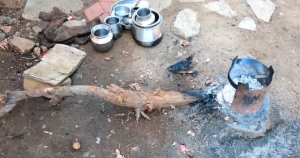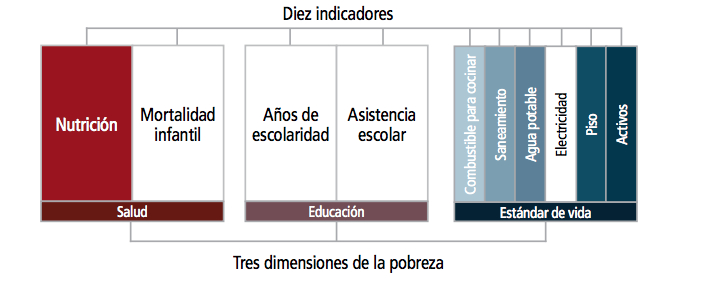Agenda Concept Note Video of UNGA 76 side event
24 September 2021 – The Multidimensional Poverty Peer Network (MPPN) and the United Nations Economic and Social Commission for Western Asia (ESCWA) co-hosted an online side event at the 76th UN General Assembly yesterday for 19 world leaders and policymakers. In the event, organised by the Oxford Poverty & Human Development Initiative (OPHI) at the University of Oxford, speakers discussed how to envision a more equitable future using Multidimensional Poverty Indices (MPIs) as policy tools. As Samheng Boros, the Secretary of State for Cambodia put it, ‘we no longer have to make policy blindly’.
Two heads of state and government, and 17 high-level representatives from countries and international agencies spoke at the event sharing how their governments had been using, or were planning to use, MPIs and multidimensional poverty analyses to guide effective interventions that curb rising multidimensional poverty.
Both the Presidents of Botswana and Costa Rica commented on the impact of COVID-19 in their countries, and the need for multidimensional measures that look at people’s overlapping deprivations to identify the most vulnerable for efficient interventions. The President of Botswana shared how the MPI has introduced greater coordination among programmes geared towards addressing non-monetary deprivations in Botswana. He spoke of how the Botswana MPI has provided more information on the deprivations that poor people experience, which helps in policy formulation, coordination, evaluation, program targeting and resource allocation. The President of Costa Rica encouraged fellow policymakers to go ahead and implement an MPI in their contexts, commenting on how the MPI has helped his government go from the traditional vision of the cash transfer to incorporate a more comprehensive understanding of the phenomena of poverty, and design policies to reduce it. The President of Botswana challenged the audience to reflect on how effective their policymaking is in practice and asked thoughtful questions: ‘Are the interventions helping the poor, to cope with the effects of the pandemic? Are our interventions inclusive, or they leaving out the poor? Are we or have we involved the poor in designing the interventions? Do we know what the poor want or the deprivations? Are we able to prioritize interventions to the most vulnerable?’
In the Ministerial segment, speakers shared their updates relating to multidimensional poverty and the impact of COVID-19. Alejandra Botero, Director of the Department of National Planning in Colombia, described how overall poverty increased from 17.5% in 2019 to 18.1% in 2020. The statistics department had blended census, health record, and institutional data to predict COVID-19 impacts and devise responses. Tan Weiping, the Deputy Director-General of the International Poverty Reduction Center in China, provided a summary of how China has achieved the goal of eradicating extreme poverty by 2021, and how the government of China has set out to counter the impacts of COVID-19 to prevent people falling back into poverty. Sania Nishtar, Special Assistant of Pakistan’s Prime Minister of Pakistan, shared details of Pakistan’s innovative management tool, the Ehsaas Implementation Tracking Index, which is an adaptation of the MPI methodology to management, and tracks progress across hundreds of initiatives addressing multidimensional poverty and gives an overview of how different regions, institutions, and target areas are advancing throughout the pandemic. José Nabor Cruz Marcelo, Executive Secretary of the National Council of Evaluation of Social Development Policy CONEVAL, Mexico, reported post-pandemic data, from 2020, indicating that multidimensional poverty and intensity had increased.
Ministers from Bangladesh, Namibia, Ethiopia, Mongolia and Thailand shared how they plan to use MPIs to monitor poverty reduction in their national development plans. Namibia’s MPI launched this June and Ethiopia’s MPI is currently in development, involving a committee incorporating eleven institutions. The Thailand MPI has been used to draft a goal to end intergenerational poverty in the 13th National Economic and Social Development Plan. Mongolia plans to launch its first MPI in 2022 and believes the MPI could be used as a performance indicator in the Vision 2050 of the National Development Framework. Close to launching its MPI, Shamsul Alam, State Minister of Planning, Bangladesh set out the calendar for future updates, the report’s structure, and how the MPI will be integrated in policy and planning processes going forward. Biswo Nath Poudel, Vice Chairman of the National Planning Commission of Nepal reflected on how Nepal had achieved rapid reduction according to the global MPI noting the role of integrating the SDGs into national development plans
In the institutional panel, ESCWAS’ Under Secretary-General and event Co-Host, Rola Dashti, spoke of recent innovations including how ESCWA is working with several Arab countries to establish a social expenditure monitor at the local level which, when mapped against the MPI for the same district or government, will assist Arab countries in drawing economic and social policies based on evidence and results. ESCWA also developed an online tool to simulate policy impacts on MPI for diagnostic purposes. Haoliang Xu, Assistant Secretary-General of the United Nations Development Programme (UNDP) catalogued UNDP’s multiple efforts to work with OPHI to advance MPIs. Efforts range from the global MPI which launches in October, to support for national MPIs and initiatives like Honduras’ Bono Unico social protection programme using multidimensional analysis for targeting. Educational tools like the second iteration of a Massive Online Open Course about building a national MPI and a forthcoming Policy Entrepreneurship handbook were also mentioned. The UNDP closed by informing the audience of its new target, recently approved, to work with policy actors globally to lift 100 million people out of multidimensional poverty by 2025. The World Bank reinforced the vital importance of up-to-date data collection for its work on human capital, particularly for girls. UNICEF highlighted how children, the world’s poorest demographic, must remain a priority, but reflected on the positive progress made in reporting with 41 countries having reported children’s multidimensional poverty estimates in the SDG Global Indicators Database under Indicator 1.2.2.
The event was a transparent exchange of challenges faced, and innovations implemented, underscored by a firm commitment among all representatives to develop and improve poverty reduction policies and share advances on the international stage to achieve the goal of sustained poverty reduction.















Recent Comments